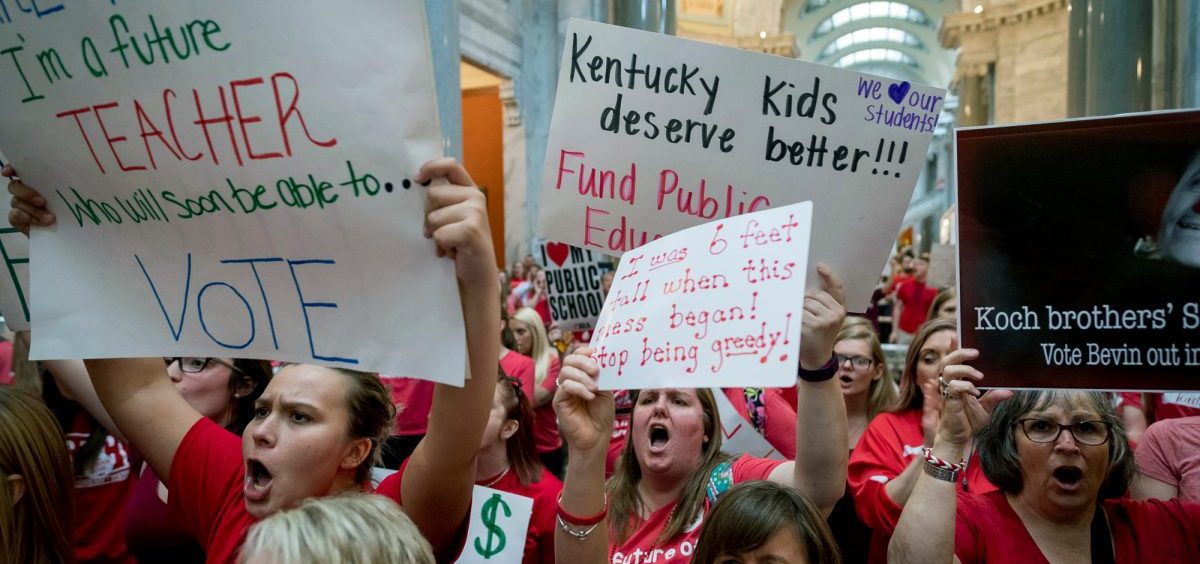News

Kentucky Judge Removed from Teacher ‘Sickout’ Case
By: Bruce Schreiner | AP
Posted on:
FRANKFORT, Ky. (AP) — A Kentucky judge whose social media interactions raised questions about his impartiality was removed Friday from presiding over a politically hot-button lawsuit challenging an investigation of mass teacher protests by Republican Gov. Matt Bevin’s administration.
The state’s chief justice, John D. Minton Jr., disqualified Franklin County Circuit Judge Phillip Shepherd from hearing the suit brought by Bevin’s political nemesis, Democratic Attorney General Andy Beshear. Bevin and Beshear are locked in a close race for governor this year.
Minton transferred the “teacher sickout” case to circuit Judge Thomas Wingate.
The lawsuit challenges the state Labor Cabinet’s authority when it demanded that several school districts turn over the names of teachers who called in sick during protests at the state Capitol during this year’s legislative session. In some districts, so many teachers called in sick that schools closed. Bevin has harshly criticized teachers for using sick days to protest, which has become a key issue in Beshear’s effort to oust the Republican incumbent.
Bevin’s legal team sought Shepherd’s removal from the case because the judge “liked” a Facebook post that showed a photo of a Democratic lawmaker with a Beshear campaign volunteer. The governor’s lawyers said that raised questions about the judge’s impartiality.
Shepherd has noted that he’s also “liked” posts that “celebrated Republicans promoting their cause (which includes the re-election of Gov. Bevin) at the State Fair, the visit of President Donald Trump to Louisville” and a reception honoring Bevin’s ticket. Shepherd has said his intent in “liking” such posts was to encourage people to “actively participate in our democracy.”
In his order Friday, Minton said he was convinced that Shepherd would have presided over the case in a “completely fair, neutral and unbiased manner.” But the chief justice noted that the standard for disqualification doesn’t require actual proof of bias.
“Rather, the standard simply requires a disqualification in circumstances where the judge’s impartiality might reasonably be questioned,” Minton wrote.
“Given that Judge Shepherd’s ‘like’ may reasonably be perceived as a public endorsement of a candidate’s campaign, that the candidate is a party in this case, and that this case involves a central issue in that candidate’s campaign, this is one such circumstance,” he added.
Beshear said Friday that his lawsuit challenging the Labor Cabinet’s actions will continue in an effort to give affected teachers “the due process they deserved.” He used some of the same harsh rhetoric against Bevin that’s become a campaign staple.
“We will continue to keep fighting to protect our teachers from this governor’s bullying, investigations and threats,” Beshear said in a statement.
Bevin spokeswoman Elizabeth Kuhn said the governor’s office “strongly” agrees with Minton’s decision, adding that it amounted to “another loss” for Beshear in pursuing his “purely political case.”
The investigation into teacher rallies found more than 1,000 educators violated state law by participating in protests that shut down schools, Bevin’s administration concluded.
No penalties were assessed, but Kentucky’s labor secretary warned that “the grace extended in this instance” won’t be applied if future work stoppages occur. The agency could have assessed civil penalties up to $1,000 per person for each day away from work.
The Kentucky Education Association, which represents tens of thousands of educators, has said the warning of future punishment amounted to a “scare tactic” to try to intimidate teachers and their allies from “having their voices heard.”
This year’s protests over several education bills in Kentucky were part of a wave of teacher activism that began last year in West Virginia and spread to other states, including Oklahoma and Arizona. The Kentucky measures included a proposal to change who manages the teachers’ pension fund as well as legislation that would have indirectly supported private schools with tax credits for scholarship funds. Last year, teachers and others staged mass rallies at Kentucky’s Capitol to protest Bevin’s efforts to overhaul underfunded public pension systems.
Shepherd has drawn Bevin’s ire for rulings in other cases, including last year’s decision that struck down a pension law backed by the governor. The state Supreme Court upheld his ruling.
Minton said in his order Friday that the disqualification case should serve as a “cautionary tale to all Kentucky judges who use social media.”
“As the Judicial Ethics Commission wisely admonished … these services are ‘fraught with peril’ for judges and should be used with extreme caution,” Minton wrote.

